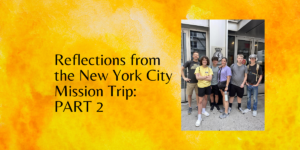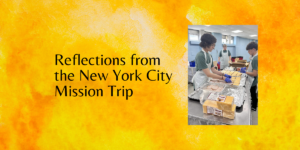August 21, 2016 – Fourteenth Sunday after Pentecost
Proclaimer: Rev. Martha Kearse
Summer Sermon Series: STORIES TO LIVE BY
Sermon: Off Road
Scripture: Luke 18:9-14; Isaiah 58:6-14
It has been a quiet week in Charlotte, NC, my hometown. One of the presidential candidates came to town this week, with the accompanying circus, although this is nothing new for Charlotte. The Charlotte Pride festival is also this week, and some people on facebook came close to losing their minds. Quite a few of them thought one of those events might be a sign of the end times, although most of them could not agree which one it was.
Sandra McLean left her office early on Thursday, she slipped out, and told her administrative assistant to forward her calls to her cell phone, which she has with her at all times, even in the shower. Sandra used to be Sandy—in middle school they laughed at her because no one had ever seen an African-American girl called “Sandy” before. Her high school years took place during the 70’s, sadly, right when the movie “Grease” came out she was 14 years old. So everywhere she went, she was Sandra Dee and she grew to hate her name. In college she experimented with going by her middle name, Marie—but when her freshman roommate insisted that she did not look like a Marie and asked her full name, she was Sandy again.
Now, she is in her 50’s, with a corner office on a floor that overlooks the Eastern view of Charlotte and most people call her Ms. McLean. Her boyfriend of 13 years calls her Sandra and does not live with her because he has a cat. She thought about him as she checked the lock on her office door—they are going away for the weekend, leaving early for a change. She has been promising him that she will spend more time with him instead of working late nights and weekends, and so they were going up to Lake Lure to a cottage they rented for the weekend. She had to get home and get the bag she had already packed and she told him they would leave the city before five. It was a good day to get out of uptown early—she has worked in the city long enough to know the nightmare of snarled traffic that happens when a dignitary comes to the Queen City.
Sam Monroe wasn’t as lucky. At least, he did not feel lucky. Sam found himself sitting on I-85 southbound, just a mile or two before the Kannapolis exit. He sat there for a good 30 minutes in his Audi S7—turbo charged, with 450 hp and a top speed around 120 mph. He thought about those 450 horses while his car inched along at around 6 miles per hour, and began to fume about what this was doing to his engine and why have a car that goes 120 mph if you’re going to sit on I -85 going 6mph? He did pretty well for the first 15 minutes. Sam has always been a pretty even-keeled guy—even his soon-to-be ex-wife, Briana, would say that he doesn’t have a temper. She told him, one time, that she could never tell if he loved her or hated her because he had the emotional range of a refrigerator. There was the time—this was when they were still dating—that they were in a bar together and another guy started hitting on Briana and he wasn’t sure whether to say anything, so he left. They almost broke up over that, but he apologized and ended up married to her for 6 and 5/12 years.
On Thursday, Sam had zipped up I -85 north to an appointment with a start-up which makes 3D printers. He lost his job last January—mostly because his sales record had been plummeting for months—and this one was the first bite he’d had the looked like it might actually work out. He had some experience with 3D printing—he’d worked on a research project on it at State—and he thought maybe this might be the thing to turn his life around. The two guys who owned the start-up, which they are calling Blok (unfortunately, he thinks, since it sounds like the name a plumber might use and they are spelling it without the “c”) –the two guys are great guys. They bought him lunch and gave him the shpiel—he can get it—ground floor—great opportunity—earning potential through the roof! But he’d be working on commission—solely on commission—until they turn a profit—which could be years.
Sam used to consider himself an optimist, but the last year of his life has worn him down. He could not figure out his young wife. As far as he could tell, things were fine—they didn’t fight—he never yelled at her—and then, last fall, she says, “I’d like you to leave—I don’t think I love you any more.” So he left, but he never quite understood what happened to the marriage. He thought about her a little bit as he sat there in the car, its motor rumbling quietly like an impatient, but well-trained cougar. What did she want from him, after all?
Sandra got off the elevator at the second level of the parking deck and waved to Dustin, the valet who parks her car for her in the mornings and brings it back to her in the evenings. She has taken a special interest in Dustin—he is a sweet young man with strong features—he reminds her of a boy she dated at Duke—and he is saving up to go to A&T next year. She has taken some ribbing about Dustin from co-workers and so she does not speak to him any more unless she knows they are alone. She could not say exactly what it is about him that calls to her, but she tips him $5, every day and asks about his application process.
She slips into her car—a Jaguar, which she loves more than she does most of the people she works with and some days more than her boyfriend. It is a sleek car, and reminds her of herself—streamlined and quick. She always smiles when she drives—she never listens to music or talk-radio, but enjoys the sound of the engine and the feel of the powerful machine all around her. She always feels like the car is an extension of herself and she pulled out onto the street this past Thursday afternoon with graceful efficiency. She eased onto the highway, congratulating herself at the skill with which she navigated the on ramp that is also an off-ramp. Whenever she has these positive thoughts about herself, she thinks about her mother and how her mother would not approve. Her mother had been a school teacher, and Sandra was never quite sure whether or not she had her mother’s approval. She had done well in school—which was something her mother thought was as basic as making your bed in the morning or cleaning up after yourself when you spilled your drink. For her mother, though, work was about service to others, and Sandra always felt that her mother looked down on her for going into business to make money. And even though her mother had never outright asked her why she did not get married and have grandchildren, Sandra often got the impression that her mother felt she had shirked her duty in neglecting to procreate. Still, her mother had come when she had gotten the award for raising almost $10,000 for the United Way—if that didn’t count for something, Sandra was not sure what else she could do. She shook the thoughts of her mother from her head as she moved onto 85 from 77 north.
Just as Sandra was pulling out of her parking garage, Sam was reaching his boiling point in the car. The line of cars in front of him extended over the next hill and beyond the next curve, with no place to exit the highway until Kannapolis and even then, where would he go? He was not going to Kannapolis—he was trying to get back to Charlotte to his terrible apartment with its beige walls and beige carpet and beige everything. His hands gripped the steering wheel until his knuckles turned completely white. Commission! He’d been well on his way to a six-figure salary at his last job! And they want him to take a job for commission? He shook the steering wheel and screamed his frustration. He took another look at the line of cars and beat his head against the head-rest. A split second decision had him opening the car door and stepping out on the blisteringly hot asphalt of the highway and slamming the door shut, just as he realized that his natural habit had made him hit the lock on the door as he got out.
He stood there looking at the locked door and listening to the hum of the engine—he could hear the air conditioner where he had it up full blast. He could see the electronic key fob sitting nicely in the convenient tray between the driver’s seat and that of the passenger. Right here, it’s important to note that Sam was not a man to use foul language. He was generally soft spoken—tall and slim, stronger than he looks, lighter skinned than most, but generally pleasant to look at. Looking at that locked door broke something open in the boy, though, and he let loose a stream of obscenities not often heard outside of comedy venues and navy mess halls. With each word, he slapped the top of his car or kicked the door or hit the window. In a memorable move, he stepped back and threw his phone, which he had gotten out of his pocket for just this purpose, right at the side window. The window, being made with tempered glass did not break, but the phone shattered at one edge on the window and at the other edge when it fell to the pavement.
Sam leaned over to pick up his broken phone, realizing that now he might not be able to call anyone to get help and fell to his knees. “God,” he said. “God, God, God, God, God.” Sam hadn’t really thought of God in a long time, but now, having said the word, he sat down, fell back against his car, and said it again, “God.” Without really meaning to, he started to think about how he had gotten to this very moment in his life. He lost his job because he hadn’t really been doing his job—he spent most days surfing the web and playing video games. The few sales he had pulled in had been flukes, and several of those had been the result of times he had outright lied to clients about the services his company provided. He’d lost his wife, too. He sat there, with the seat of his pants starting to melt into the pavement and tried to picture her face. And he realized he hadn’t really looked at her in a long time. Maybe he never really looked at her. He certainly hadn’t thought about her or done anything for her except go places with her sometimes and pay for dinner. When had he been a husband to her? When had he loved her?
Around Sam, the horns started to blow because while the traffic wasn’t moving fast, Sam’s car was now no longer even going six miles per hour. Sam got up slowly off the asphalt and leaned back against his car. He looked up into a sky so blue and bright it hurt his eyes. “God,” he said, not even caring that he looked like an idiot there on the highway, “God, if you’re listening, I am really sorry. I get it. I do—I was a terrible employee and a terrible husband. I haven’t really cared about anything or anybody in a long time.” As he spoke the words, he thought of his coach in high school. He had played basketball, first JV, then Varsity for two years. His coach used to say to him, “One day, you’re going to care about this game, boy—and I’d like to be there on that day, because you will be really something.” Sam hung his head and smiled, and started taking off his shirt.
Sandra got on I-85 north and cruised happily up the road. She hadn’t felt this good in a long time. Maybe Simon was right—maybe she ought to take more vacations. Although if she did, she knew things would be a mess when she got back. Just thinking of all the things her assistant was sure to forget tomorrow made her reach for her phone. She glanced to her left as she did so, and saw the line of cars piled up in the southbound lanes. She couldn’t help but pity them—such a long line. Sometimes, when she saw a line of cars like that, she wished she could signal them to get off the highway, but what good would that do? She glanced down at her speed, which was a constant 68mph, thanks to her cruise control, and then saw a man out on the highway next to his car. He had wrapped his shirt around his hand and was apparently breaking his window. “Thank God I’m not that guy!” she said as she cruised by. She found her assistant in her favorites list and hit the button to dial her up.
Sam got back into the car after he broke the window. He was sitting on some broken glass, but he didn’t think that would really make the day that much worse. He decided that when he got to the Kannapolis exit, he’d get off. He’d find some mom and pop restaurant and have an early dinner. He might call those guys at Blok and take the job. And then he might drive—just drive out into the evening. He might let the road take him where it would. He might keep taking random turns until the sky around him was blue with the darkness and the light of a crescent moon. Out away from the lights of the city—out where he might see a few stars. And so that is exactly what he did.
And that’s the news from St. John’s, where all the women are strong, all the men are good-looking and all the children are above average.









